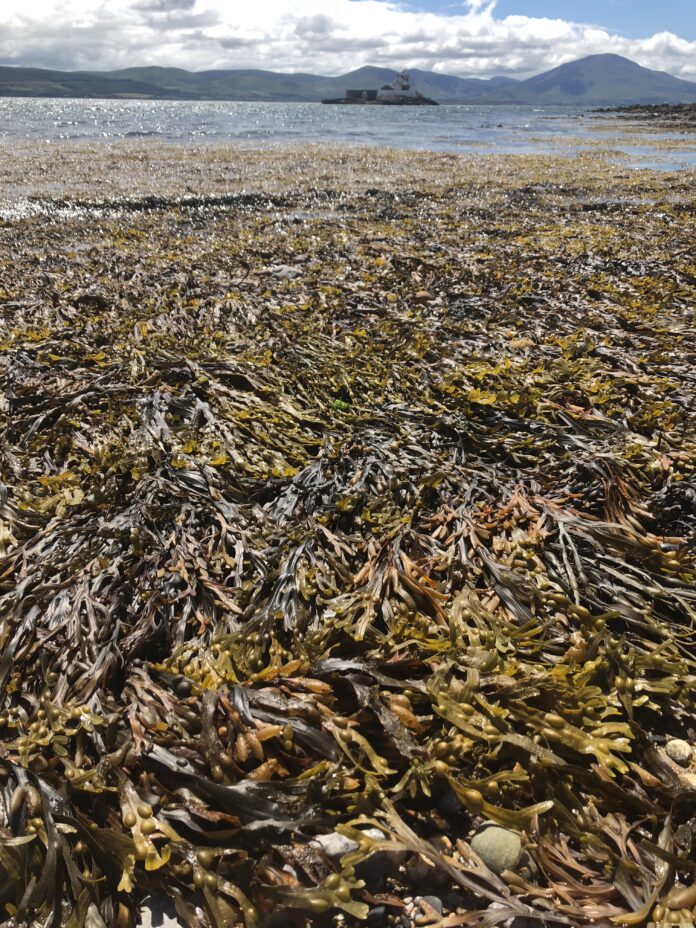Dr. Karen O’Hanlon looks at the fertiliser and pesticide supply issue in Ireland. Could our natural marine environment be the answer?
The agrichemical industry came to the fore in the years following World War II. Post-war Germany had a surplus of synthetic nitrogen, a material commonly used in munition factories. Nitrogen, in the form of urea, as found in farmyard manure, was well known to increase crop growth, and synthetic forms of urea were found to yield excellent results in an agricultural setting. Supported by German government aid, two agrichemical companies, BASF and Bayer, were formed to re-purpose such nitrogen.
Over the next decades, Europe began to grow an abundance of food, thanks in part to the plentiful supply and liberal use of these chemical fertilisers and other pesticide products. Old methods of growing crops were surpassed with innovative chemically-focussed approaches. The application of these chemicals facilitated more intensive farming practises, such as monocropping and the growing of winter and summer crops on the same land, year after year.
This pattern developed and strengthened for decades. High doses of fertilisers and pesticides became the norm in the effort to increase yields and combat unwanted diseases. Ironically, because Third World developing nations didn’t have the capital to invest in such chemicals, they instead relied on ancient practises and inherited farm management skills. Today, most First World nations have lost that important biological, biofertiliser, and plant growth-promoting microbial knowledge. This knowledge now needs to be imported from Third World nations!
Fast forward to the 2000s, and the focus within European agriculture and pesticides began to shift towards protecting the environment. It became important to protect fish, birds, bees, and small mammals just as much as humans. Every year, between 150-200 pesticides are removed from the shelves, mainly due to failing increasingly restrictive environmental risk assessments, whilst cancer-causing and endocrine-disrupting chemicals get an immediate ban.
Coupled with this squeeze on pesticides, we have a fertiliser price and usage crisis.
China (with its rich reserves of the raw material, rock phosphate) suspended exports of fertilisers in 2021, which has restricted supply and, as a result, fertiliser price increases of over 250% have become commonplace. Unsurprisingly, farmers are finding it more and more difficult to afford or obtain chemical fertilisers, and regenerative farming practises are being increasingly explored by innovative farmers in this sector. Researchers and the industry are quickly responding by developing more biology-based natural products, as opposed to chemical-based products, in an attempt to replace the chemicals and fertilising agents that are disappearing from our shelves.
Some farmers saw this coming and many have changed their approach, choosing to partially or fully replace chemicals, and have been educating each other in the process. There is an increasing body of regenerative farmers, all doing their own research (i.e. Base Ireland and Farming for Nature).
Ireland has an abundance of marine products off the coast that could play a role in these regenerative farming practices. Seaweed has long been known to possess fertilising and pesticide properties. Irish seaweeds, Ascophyllum nodosum and Laminaria Digitata, were trialled in 2021 (see article in summer 2021 Horticulture Connected – Harnessing Natural Products From The Sea For Use in Horticulture).
- The better-known attributes of seaweed are as a biocontrol and biofertiliser in helping to improve roots, nutrition, and the quality of crops by supplying vitamins and minerals whilst also producing phytohormones that act as bio-stimulants encouraging immunity to disease, healthy growth, and colour.
- Seaweed can absorb as much CO2 as trees and hence can contribute to CO2 sequestration. Carbon sequestration is the process by which CO2 is removed from the atmosphere and held in solid or liquid form; Plants can absorb CO2 during growth and store it in different tissues. The most important tissue for carbon sequestration is the root. Good organic practises encourage healthy soil/root interactions with the accumulation of microbial life around the root.
- Many biofertilisers on the market encourage such symbiosis between soil life and root. Seaweed as a foliar spray activates the plants’ growth and protection systems to produce plant growth regulators, phytohormones to protect from diseases, and biomolecules to counteract drought, heat, frost, etc. Numerous progressive wholesale horticulture growers in Ireland are using seaweed as a biostimulant at a 1:200 dilution during watering and enriching further with microbial mixes (including Bacillus subtilis and Pseudomonas fluorescence) to control root issues such as Rhizoctonia and Fusarium.
An update on these 2021 trials is summarised below:
A potato trial on Airabella was carried out by Colm O’Driscoll Head Gardener in Airfield Estate, Dundrum, Co. Dublin. Seed potatoes were dipped in a container of seaweed gel of Laminaria and immediately placed in the seed hole. 90 seed potatoes were sown in the untreated control plot and 133 in the treated plot. Yield analysis was recorded by weight and undersized potatoes were also recorded. Any disease on the potatoes was observed. Results showed that in the control (untreated) plants 0.53Kg/plant was produced, compared to 1Kg per plant in the treated plots. No disease was noted in the control or treated plots. Therefore, there was almost a 100% increase in yield in plants treated with seaweed gel. Undersized potatoes showed an almost 100% reduction in the treated plant also.
A grassland trial was carried out by Anthony Mooney in Kildare, a farming for nature ambassador, who compared the growth rates over 15 days in September 2021, using many different marine products. Fish hydrolysis, boiled seaweed, cold-pressed seaweed and microbes, crushed shellfish as a soil conditioner, and more were all trialled. Results ranged from a 79.2% dry matter increase versus control for cold-pressed seaweed plus microbes to a 5.9% dry matter increase versus control for boiled seaweed with added minerals. An increase in metabolisable energy in grass grown using all seaweed-based products was also shown.
A trial on spring barley (Erigal) was carried out by Seedtech Technology using microbes and seaweed. Probiotics were added to seed and crops were sprayed every three weeks after establishment. The barley seed trial quality was above the hectolitre required (63 weight KPH) in all plots, no treatment, the gold standard fungicidal treated barley, and seaweed treated barley. The yield per Ha of (111%) for the biostimulants treated plots was higher than the no treatment (109%) and Kinto treated grain (109%). Disease suppression on the measured disease was similar with all 3 plots analysed.
A trial on spring oats (Jounence) was carried out by Seedtech Technology using microbes and seaweed. Probiotics were added to seed and crops were sprayed every three weeks after establishment. Yield increases went from €207 for control grain to €212 for treated grain, a €5 increase per tonne for the grower using the biostimulants. The most important increase is shown in the quality of the grain, which has increased from 51.22 weight KPH for the controls, to 52.53 KPH – representing a 1.31% increase in grain quality. The cut-off score for oats is 50, so the use of the biostimulants can guarantee the quality of the oats for use in the equine and human food industry.
A trial on grassland growth after application of biochar to the soil with seaweed as a grass biostimulant is being carried out by Carbery Group Limited of Bandon Co. Cork. Results to date are not brilliant (8.2 tonnes grass/Ha in 2021) compared to fertilised grassland (13 tonnes grass/Ha in 2021). However, we have seen an increase in broadleaves in the pasture. Going into the second year we will see the biology in the soil functioning better. Biodiversity increase and a natural shift to multi-species swards, without the need for reseeding – coupled with the ever-increasing fertiliser input costs – make this trial an interesting marathon rather than a sprint event!

Karen O’Hanlon is the founder of Probio Carbon. She has coordinated field trials on plant growth-promoting bacteria across Europe and has worked as an Ecotoxicologist in the Department of Agriculture. Contact details: info@probiocarbon.ie. Telephone: 087 9816569. www.probiocarbon.ie |





